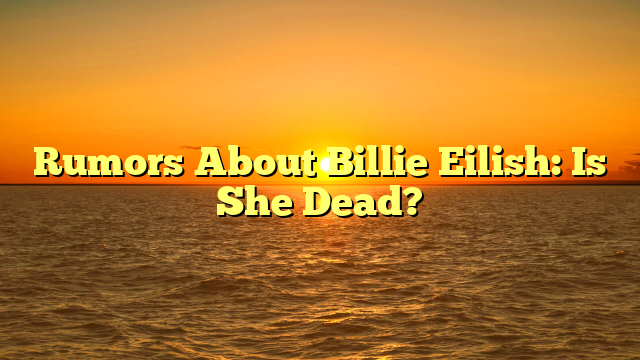## The Eilish Enigma: Debunking the Rumors of Billie Eilish’s Death
The internet. A vast and wondrous place where information flows freely, sometimes a little *too* freely. This digital ocean is where facts swim alongside fiction, and sometimes, tragically, completely unfounded rumors gain a life of their own. One such rumor that has periodically surfaced, shocking and upsetting fans worldwide, is the claim that Billie Eilish is dead. This article aims to thoroughly investigate the origins of this persistent rumor, analyze its spread, and ultimately, definitively debunk it.
### The Genesis of the Rumor: Misinformation’s Breeding Ground
The precise origin of the “Billie Eilish is dead” rumor is difficult to pinpoint. It doesn’t seem to stem from a single, easily traceable source. Instead, it appears to have emerged organically, likely fueled by several contributing factors. The inherent anonymity of the internet allows for the creation and dissemination of false information with relative ease. Social media platforms, while connecting people globally, can also become breeding grounds for misinformation, particularly when sensationalist claims generate engagement through likes, shares, and comments.
One theory suggests the rumor started as a hoax, perhaps an attempt at a cruel prank or a misguided attempt at viral marketing. Others speculate it’s linked to the cyclical nature of online conspiracy theories. Certain keywords or hashtags, when searched, might inadvertently lead users down rabbit holes of fabricated information, further propagating the false narrative. The intense online following Billie Eilish possesses – a testament to her immense popularity – only exacerbates this problem. The sheer volume of fans makes her a prime target for such rumors, as the larger the audience, the more likely the rumor will gain traction.
### Analyzing the “Evidence”: A Deep Dive into False Claims
The supposed “evidence” presented to support the claim of Billie Eilish’s death is typically flimsy at best and demonstrably false at worst. These often include manipulated images, fabricated news articles, or out-of-context social media posts. These manipulated materials are designed to appear authentic, preying on the emotional vulnerability of fans who are genuinely concerned about the singer’s wellbeing.
* Fake News Articles: Many instances involve fabricated news articles, often featuring sensationalized headlines and low-quality images. These articles lack verifiable sources, credible journalists, and any connection to legitimate news organizations. A quick fact-check would reveal the fabricated nature of these reports.
* Misinterpreted Social Media Posts: Social media posts, especially those expressing grief or sadness, are frequently taken out of context and used as “evidence” to support the false claim. This demonstrates the ease with which manipulated information can be spread and believed without critical evaluation.
* Deepfake Technology: While deepfake technology isn’t typically used in these specific instances, its potential for creating convincing yet fake videos poses a significant threat to future misinformation campaigns. The future might see more sophisticated fake videos used to further propel false narratives surrounding celebrities.
### The Power of Verification and Critical Thinking
Combating misinformation requires a proactive approach involving media literacy and critical thinking. Before accepting any information as truth, especially online, it’s crucial to verify its authenticity. This involves checking multiple sources, examining the credibility of the source, and looking for evidence of manipulation or bias. Reputable news outlets, official artist statements, and the artist’s verified social media accounts should be the primary sources of information.
Furthermore, we must be wary of sensationalized headlines and emotionally charged language, as these are common tactics used to manipulate and spread misinformation. A healthy dose of skepticism is vital in navigating the digital landscape and avoiding the pitfalls of online falsehoods.
### The Ongoing Battle Against Misinformation
The persistence of the “Billie Eilish is dead” rumor highlights the ongoing struggle against misinformation in the digital age. While definitively debunking the rumor is relatively simple – Billie Eilish is very much alive and continues to be active in the music industry – the very existence of the rumor serves as a stark reminder of the challenges we face. The spread of such false narratives underscores the importance of media literacy, critical thinking, and responsible online behavior.
### Conclusion: Truth Triumphs, but Vigilance Remains Key
The rumor of Billie Eilish’s death is entirely false. This thorough examination reveals the rumor’s lack of credible evidence and highlights the manipulative tactics used to spread it. While the rumor itself is easily debunked, the incident underscores the urgent need for individuals to develop strong critical thinking skills and a healthy skepticism towards unverified information online. The constant vigilance of fact-checking and responsible information sharing is essential to combat the spread of harmful misinformation and protect the reputations of public figures, fostering a more informed and responsible digital environment for everyone.

